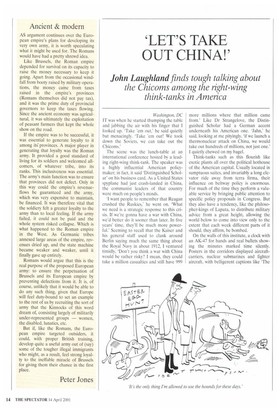Ancient & modern
AS argument continues over the European empire's plans for developing its very own army, it is worth speculating what it might be used for. The Romans would have had a pretty shrewd idea.
Like Brussels, the Roman empire depended for survival on its capacity to raise the money necessary to keep it going. Apart from the occasional windfall from booty raised by military operations, the money came from taxes raised in the empire's provinces (Romans themselves did not pay tax), and it was the prime duty of provincial governors to keep the taxes flowing. Since the ancient economy was agricultural, it was .ultimately the exploitation of peasant farmers that kept the whole show on the road.
If the empire was to be successful, it was essential to generate loyalty to it among its provinces. A major player in generating that loyalty was the Roman army. It provided a good standard of living for its soldiers and welcomed allcorners, of whatever tribe, into its ranks. This inclusiveness was essential. The army's main function was to ensure that provinces did not defect. Only in this way could the empire's revenueflows be guaranteed and the army, which Was very expensive to maintain, be financed, It was therefore vital that the soldiery felt a greater loyalty to the army than to local feeling. If the army failed, it could not be paid and the whole system risked collapse. Which is what happened to the Roman empire in the West. As Germanic tribes annexed large areas of the empire, revenues dried up, and the state machine became weaker and weaker, until it finally gave up entirely.
Romans would argue that this is the real purpose of the proposed European army: to ensure the perpetuation of Brussels and its European empire by preventing defections from it. It is, of course, unlikely that it would be able to do any such thing, given that Europe will feel duty-bound to set an example to the rest of us by recruiting the sort of army that the Kinnocks of this word dream of, consisting largely of militarily under-represented groups — women, the disabled, lunatics, etc.
But if, like the Romans, the European empire targeted outsiders, it could, with proper British training, develop quite a useful army out of (say) some of the tougher illegal immigrants who might, as a result, feel strong loyalty to the ineffable miracle of Brussels for giving them their chance in the first place.
Peter Jones


























































 Previous page
Previous page